New Hampshire Primary: Clinton Holds Solid Lead
The latest Rasmussen Reports survey of the New Hampshire Presidential Primary shows Hillary Clinton leading Barack Obama by fifteen percentage points.

The latest Rasmussen Reports survey of the New Hampshire Presidential Primary shows Hillary Clinton leading Barack Obama by fifteen percentage points.

Forty-five percent (45%) of Likely Voters were able to identify Mitt Romney as the winner of the recent straw poll in Ames, Iowa.

Three-quarters (75 percent) of U.S. workers think companies have responsibilities to the community.

Former Senator John Edwards (D) and former Mayor Rudy Giuliani (R) are now two points apart in the presidential race, with Edwards leading 46% to 44%.

Former New York City Mayor Rudy Giuliani has a ten-point lead over New York Senator Hillary Clinton in race for Colorado’s nine Electoral Votes. It’s Giuliani 50%, Clinton 40%.
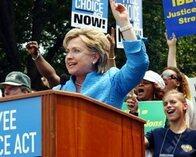
If Senator Hillary Clinton is the Democratic Presidential candidate in 2008, the race for Ohio’s 20 Electoral College votes might be just as close as it was in 2004.
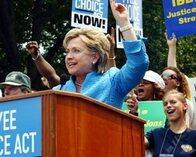
Early in the 2008 cycle, New York Senator Hillary Clinton has a modest edge over two Republican hopefuls and a larger lead over two others in New Hampshire.

Senator Hillary Clinton leads all Republican hopefuls in the race for Florida’s 27 Electoral College votes. The Sunshine State cast its votes for the Republicans in each of George W. Bush’s election victories.

Karl Rove, the enormously influential advisor to President George W. Bush, is resigning from the White House staff effective August 31.

This week’s numbers show the Clinton tide receding just a bit and Obama recovering some lost ground.
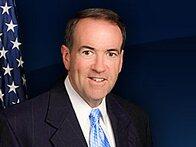
In the coming weeks, we’ll see whether a straw poll with light turnout in Ames, Iowa really matters in the race for the Republican Presidential nomination.

Seventy-nine percent (79%) of American adults favor a proposal requiring employers to fire workers who falsify identity documents.

Forty-nine percent (49%) of American voters believe that the Federal Government Itself has become a special interest group.

Fifty-nine percent (59%) of voters believe that allowing the government to intercept phone calls from terrorist suspects makes America safer.

Not much has changed in the Barack Obama-Fred Thompson match-up since two weeks ago.
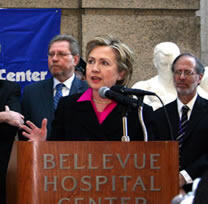
New York Senator Hillary Clinton’s recent remarks on lobbyists have drawn fire from other challengers seeking the Democratic Presidential nomination.
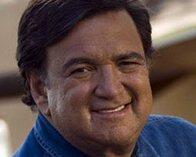
A new national telephone survey shows former Mayor Rudy Giuliani now leading New Mexico Governor Bill Richardson 47% to 39%.

After months of registering one of the highest levels of worker confidence, sentiment among Tampa employees recorded its second consecutive record low in July. The city’s Hudson Employment IndexSM fell 4.5 points to 91.6 in July. Layoff fears, weakened finances and lower job satisfaction contributed to the decrease. The Index for Tampa registered 118.7 one year ago. The national Index, based on responses from approximately 9,000 workers nationwide, rose 4.6 points to 105.8 in July.

Florida worker confidence fell for the fourth consecutive month in July, as the state’s Hudson Employment Index (SM) dropped 5.1 points to 92.6, the lowest on record for the state. Increased worry over job loss drove the decline. The state’s latest measure of worker confidence is a drastic 25.3 points lower than last July’s reading of 117.9. The national Index, based on responses from approximately 9,000 workers across the country, rose 4.6 points to 105.8.

Worker confidence improved in Boston in July, as the city’s Hudson Employment Index (SM) rose 3.5 points to 104.8. Fewer layoff expectations and less job security concern contributed to the increase. Boston’s latest Index is more than seven points stronger than last July, when it registered 97.7. The national Index, based on responses from approximately 9,000 workers, also rose 4.6 points to 105.8.